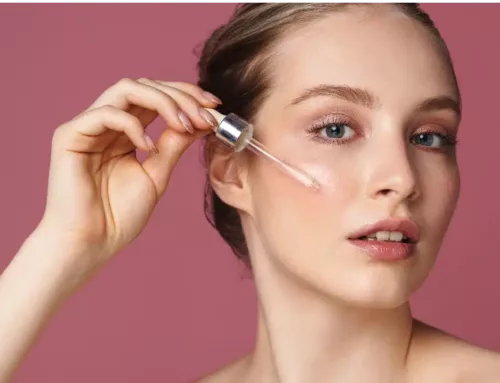Our skin is the largest organ that serves as a protective barrier between our bodies and the outside world. Therefore, it is not only a reflection of our appearance but also of our health and well-being. The most important key to achieving healthy, glowing skin is understanding your skin type and taking care of it accordingly. From the skincare products you choose to your daily routines, knowing your skin type and making decisions based on it will play a significant role in preventing or delaying issues like acne, dryness, cracking, and premature aging.
How to Determine Your Skin Type?
To determine your skin type, start by gently washing your face with a sulfate-free cleanser and remove any makeup and impurities from your skin. After cleansing, do not apply any products like toner, moisturizer, or sunscreen. Allow your skin to breathe and return to its natural state for approximately one hour. Your skin might be;
- Normal if your skin looks elastic and clean, neither too oily nor too dry,
- Oily if it looks oily and shiny especially in the T-zone,
- Dry if it appears tight, dull, or flaky,
- Combination if there’s some oiliness in the T-zone while other areas are dry or normal,
- Sensitive if you experience discomfort signs like redness or itching.
Keep in mind that factors such as age, weather conditions, and changes in your skincare routine can cause your skin type to change over time. Therefore, it’s crucial to periodically reassess your skin type and adjust your skincare routine accordingly. Now, let’s explore how to care for your skin type together.
Normal Skin:
Normal skin is what most people aim for since it typically has a balanced sebum (oil) production, small pores, and an even complexion. If you have normal skin, your goal is to protect it from environmental factors and keep it moisturized.
- Use a gentle, sulfate-free cleanser that won’t strip your skin of its natural oils.
- Nourish your skin with a light, non-comedogenic moisturizer that won’t clog your pores. You can complement this with a serum like PSR Skincare Skin Glow.
- Use a broad-spectrum sunscreen with at least SPF 30 daily to protect your skin from harmful UV rays.
- Exfoliate your skin once a week with a gentle peeling treatment to remove dead skin cells and support cell renewal.
Dry Skin:
Dry skin lacks the necessary oils to retain moisture, which can lead to a dull, flaky appearance and a feeling of sensitivity. Too dry skin may experience discomfort such as redness and itching. Therefore, individuals with dry skin should focus on using moisturizing products that lock moisture in the skin and avoid products that overly dry and tighten the skin.
- Use creamy or oil-based cleansers to prevent the natural oils from being stripped away.
- Be diligent about keeping your skin moisturized. Choose products rich in beneficial ingredients like hyaluronic acid and ceramides. You can enhance your moisturizer with serums like Clarity, Oil-In-One, and Radiance from PSR Skincare.
- Ensure daily protection from environmental factors and especially from sun rays by using sunscreen.
Oily Skin:
Oily skin is characterized by an excessive production of sebum, the skin’s natural oil. This excess oil can lead to enlarged pores, acne, and a greasy appearance, especially in the T-zone (forehead, nose, and chin). While prone to acne, oily skin tends to age more slowly because natural oils help maintain moisture and reduce the appearance of fine lines and wrinkles. To care for oily skin properly, avoid harsh products that stimulate more oil production.
- Use a gentle, foam or gel-based cleanser to remove excess oil and dirt from your skin.
- Applying an alcohol-free toner that matches your skin’s pH level can help balance oil production and tighten pores.
- Choose a non-comedogenic, oil-free moisturizer to avoid clogging pores. Don’t forget to nourish and keep your skin moist with products like PSR Skincare’s It’s a Blur Serum.
- Use a mattifying sunscreen to control shine during the day.
Throughout the day, you can use blotting papers to remove excess oil from your skin. Additionally, you can apply a light clay mask once a week to rid your face of excess oil buildup.
Combination Skin:
Combination skin is a common type that displays characteristics of different skin types in various areas of your face. Typically, the T-zone is oilier, while the cheeks may be normal or dry. Due to these differences, you can use different products for different areas of your face or look for products designed specifically for combination skin.
- Regularly cleanse your face with a gentle cleanser that maintains your skin’s pH balance.
- Apply a toner that can cleanse and tighten the oily areas of your skin.
- Use lightweight and oil-free moisturizers. For drier areas, you might want to use richer moisturizers.
- Balance your skin in different areas with serums like Hydra Skin and It’s a Blur from PSR Skincare.
- Perform a mild exfoliation once a week to remove excess oil from your T-zone without harming the drier areas.
- Opt for a mattifying sunscreen for your oily areas.
Sensitive Skin:
Sensitive skin is prone to irritation, redness, and reactions to various skincare products and environmental factors. It can be dry, oily, or normal, but it easily reacts to weather conditions, pollution, and certain skincare ingredients. When caring for sensitive skin, choose hypoallergenic products that are free from perfume, alcohol and harsh chemicals. It’s also good practice to patch-test new products to prevent allergic reactions.
- Gently cleanse your skin with fragrance-free and hypoallergenic cleansers.
- Similarly, opt for moisturizers that are hypoallergenic and won’t clog your pores. You can use products specially designed for sensitive skin, like PSR Skincare Care Bare Serum.
- Use a high-protection sunscreen that won’t cause irritation.
In summary, determining your skin type is the first step toward achieving healthy skin. While genetics play a significant role in determining your skin type, external factors can also influence it and cause changes over time. Adjusting your skincare routine based on your skin type can help maintain your skin’s health and achieve the desired appearance. Remember that consistency and a healthy lifestyle are crucial in reaching these goals. Sticking to your routine, staying hydrated, and paying attention to your diet are some of the best investments you can make in your skin.






